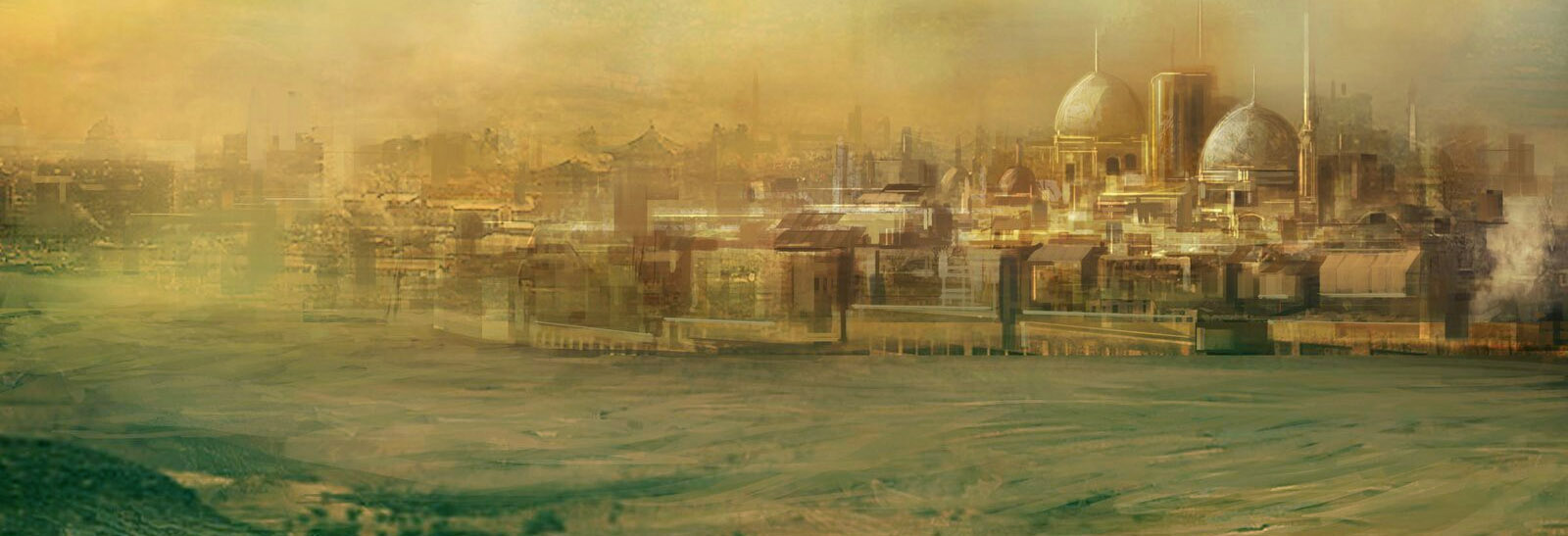Daqehi
Our capital city of Daqehi was founded by prostitutes and is home to both the seat of the government and one of the largest Uyayonist churches. I'm surprised the church can stand to be located in a city so filled with degenerate sinners, and I don't think they're fond of the prostitutes, either.Daqehi, last stop before crossing the desert. Or, first stop before crossing it depending on which way you're going. Either way, a good place to stock up on supplies. The city is most famous for being the capital of Maloa and only place in Maloa where, *ahem*, "paying to get your 'shirt' 'washed'" is legal. Don't even think of shirking on the bill, either - these ladies run the town.
Demographics
The majority of the town is ethnically Malo, but it has a small minority community of Tanishites who are based there after several desert crossing. Various regional groups related to the Malo are also present.
As the capital, the town is also host to a variety of political figures. A number of satellite communities have grown up around the town as royal family members establish elaborate villas in the countryside and then villages of land workers and servants crop up around them.
Although the city was built on the work of "laundresses", the majority of the town now are farmers, weavers, construction workers, or carpenters. It is, however, the one place in Maloa where a destitute woman can become a "laundress" without significant social stigma. Apart from the town's famous "laundresses", there are also women who make money by washing other people's clothing, and they occasionally have a great deal of trouble communicating their profession. This has led to more than one humorous misunderstandings, but it's good to have them around for the occasional traveller who shows up at the Wash House with a pile of laundry and innocent confusion.
Mbassi's Wash House is on the west side of town, and the church is on the east. Those religiously inclined try to stay away from what they considered the "degenerate" side of town. Meanwhile, those who support the town's legacy try to avoid the "sticks up their behinds" side of town.
Government
The town is run by a chief officially, but his sister or mother, the chieftess, has more power. She is the overseer of the various brothels in the town (except the original Mbassi's Wash House, which is still run by the queen, though proceeds go directly to Daqehi). The chieftess of Daqehi is one of the most powerful people in Maloa. As the capital, Daqehi is independent, and she does not answer to any Master of the Land.
History
Before the Fourth Reckoning, the town known as Naaf made its wealth as the last major stop before crossing the Eni Belul. It was the nexus for a network of small villages in the region who came to Naaf to trade their farmed goods. Then the Reckoning happened, and trade across the desert vanished overnight. Merchants on both sides were too busy trying to survive to go on risky caravans. The dependant villages stopped coming to trade as well, because Naaf had nothing to give them and they needed all their food for themselves. The whole region sank into poverty.
The chief's sister, Mbassi, decided to find a solution. She went through the town and met with all the women to try to find a new source of income. She was able to find one group of women who still had money coming in. When asked, they all gave their profession as "laundress". "Laundering for money" had long been forbidden in Uyoyanist communities as it was seen as a corruption of a celebrated and pure act. Mbassi saw it as an opportunity.
Mbassi travelled throughout the villages to find other such "laundresses" and invited them to come back with her to Naaf. There, she took over a villa that had sat empty since its owners fled during the Reckoning and provided free lodging to all the women in exchange for 50% of their earnings. Then, she put out the word.
The idea didn't need much advertising. Satisfied customers gladly spread the word to their friends. In a region devastated by disaster, it turned out there was one commodity that many men were still willing to spend money on. Within a few years, Naaf was once again booming. Mbassi's Wash House (as it was always called with a knowing raise of the eyebrows) brought in travellers, and entrepreneurial locals were quick to get more money out of them in the form of inns, shops, and taverns. The town became known throughout the region as "*Ooleteh udo eq Daqehi*", 'Town with the laundresses', which eventually was shortened to just Daqehi. Locals insisted on calling it Naaf for a few generations, but it was a losing battle as all the new residents, lured in by its booming economy, kept calling it Daqehi.
The church was not happy with the arrangement. Uyoyano did not and still doesn't condone "laundering for money", believing that asking money for an act so pure and vital to life was the influence of Sawaatil. In the 5th year after the opening of the house, the Master Assassin of the Naaf region attempted to assassinate Mbassi. By a stroke of luck, a freak gust of wind blew the arrow off track. This was seen as divine intervention and the church grumpily accepted that Ban Kekuma approved Mbassi's sin for the great good of re-establishing the town. To this day, however, the church refuses to call the town Daqehi and exclusively uses the term Naaf.
The chief of Daqehi was the first king of Maloa, and since then, the town has served as the capital of the kingdom.


